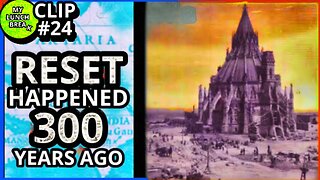Premium Only Content

QURAN found on the bottom of the sea #religion #fact #mohammadcreation #quranverses #viralvideo
सूर्य ग्रहण (Solar Eclipse)
चांद ग्रहण (Lunar Eclipse)

About solar and lunar eclipse according to quran
The Quran mentions eclipses in several verses. In Surah Al-Qamar (54:1-2), it says:
"The Hour has come near, and the moon has split [in two]. And if they see a miracle, they turn away and say, 'Passing magic.'"
This verse is often interpreted as referring to a historical event where the moon appeared to split in two, although some scholars argue that it is a metaphorical reference to the coming of the Day of Judgment. The verse also mentions people's tendency to deny or dismiss miraculous signs.
In another verse, Surah Al-Baqarah (2:189), the Quran refers to the use of lunar phases for determining the timing of religious practices:
"They ask you about the new moons. Say, 'They are measurements of time for the people and for Hajj.' "
This verse indicates the importance of the moon in Islamic religious practices, including the timing of the Hajj pilgrimage and the beginning and end of the fasting month of Ramadan.
Overall, while the Quran does mention eclipses and the importance of the moon in Islamic practices, it does not provide detailed scientific explanations of these phenomena. Modern scientific understandings of solar and lunar eclipses are based on observations and measurements that were not available at the time the Quran was revealed.
About lunar Eclipse
The Quran mentions lunar eclipse in Surah Al-Qiyamah (75:8-9), where it says:
"And when the moon is eclipsed, and when the sun and moon are joined together."
This verse is often interpreted as a reference to the phenomenon of lunar eclipse, which occurs when the earth passes between the sun and the moon, casting a shadow on the moon. The verse describes the moon being "eclipsed," which is the term used to describe when the moon passes into the earth's shadow.
The Quran also mentions the importance of observing the lunar phases for determining the timing of religious practices, as mentioned in Surah Al-Baqarah (2:189):
"They ask you about the new moons. Say, 'They are measurements of time for the people and for Hajj.' "
This verse emphasizes the importance of observing the lunar cycle for determining the start and end of important religious practices, including the timing of the Hajj pilgrimage and the beginning and end of the fasting month of Ramadan.
Overall, while the Quran does mention lunar eclipses and the importance of observing the lunar cycle in Islamic practices, it does not provide detailed scientific explanations of these phenomena. The scientific understanding of lunar eclipses is based on observations and measurements that were not available at the time the Quran was revealed
About Solar Eclipse
The Quran, the central religious text of Islam, does not provide any specific details about solar eclipses. However, there are a few general verses in the Quran that mention the signs of Allah's power and greatness, which some people may interpret as referring to natural phenomena such as solar eclipses.
For example, one verse in the Quran (41:37) states: "And among His signs are the night and the day, and the sun and the moon. Do not prostrate to the sun or to the moon, but prostrate to Allah who created them, if it is Him you worship." This verse acknowledges the existence of the sun and the moon as important celestial bodies, but emphasizes the worship of Allah as the true focus of faith.
Another verse in the Quran (2:258) describes a miraculous event in which Allah caused the sun to rise from the west instead of the east. While this verse does not specifically mention a solar eclipse, it does highlight the power and control that Allah has over the natural world.
In Islamic tradition, there are also various hadiths (narrations) attributed to the Prophet Muhammad that mention solar eclipses. For example, it is reported that during the lifetime of the Prophet Muhammad, a solar eclipse occurred, and he led a congregational prayer in response to it. The Prophet is said to have made a lengthy prayer during the eclipse and then explained to his companions that such events are signs of Allah's power and should be taken as a reminder to turn towards Him in worship and repentance.
Overall, while the Quran does not provide specific information about solar eclipses, it emphasizes the power and control of Allah over the natural world and encourages believers to use such events as reminders of their faith and devotion
#solar ecplise
#lunar ecplise
#viralvideo #religion #fact #copyrightfree #ramadannights #miracleofquran #ramadanmubarak #qurancover #quranverses #mohammadcreation
FOLLOW US FOR MORE INFORMATION ❣️💗❤️
-
 2:46
2:46
BIG NEM
6 hours agoDiscovering RAKIJA: The Holy Liquer of the Balkans
441 -
 1:11:38
1:11:38
Film Threat
11 hours agoCHRISTMAS DAY CHILL STREAM WITH CHRIS GORE | Hollywood on the Rocks
123K24 -
 14:22:40
14:22:40
The Quartering
1 day agoYule Log Christmas MAGA Edition With Memes! Come Hang Out!
213K29 -
 38:41
38:41
MYLUNCHBREAK CHANNEL PAGE
1 day agoTimeline Begins in 1800? - Pt 1 & 2
94.6K48 -
 1:23:41
1:23:41
Game On!
1 day ago $13.01 earnedNetflix NFL Christmas Games Preview and Predictions!
84.9K13 -
 2:05:07
2:05:07
Darkhorse Podcast
1 day agoWhy Trump Wants Greenland: The 257th Evolutionary Lens with Bret Weinstein and Heather Heying
313K672 -
 8:50:58
8:50:58
Right Side Broadcasting Network
1 day ago🎅 LIVE: Tracking Santa on Christmas Eve 2024 NORAD Santa Tracker 🎅
412K60 -
 2:48
2:48
Steven Crowder
1 day agoCROWDER CLASSICS: What’s This? | Nightmare Before Kwanzaa (Nightmare Before Christmas Parody)
361K13 -
 33:49
33:49
Quite Frankly
1 day agoThe Christmas Eve Midnight Telethon
148K30 -
 2:12:46
2:12:46
Price of Reason
1 day agoAmber Heard BACKS Blake Lively Lawsuit Against Justin Baldoni! Is Disney CEO Bob Iger in TROUBLE?
92.4K27